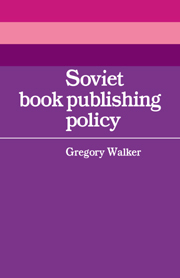Book contents
- Frontmatter
- Contents
- Acknowledgments
- Glossary of specialised terms
- Note on transliteration
- References to journals and series
- 1 Introduction
- 2 The political and economic view of Soviet publishing
- 3 The Communist Party
- 4 The government apparatus
- 5 The publishing-house
- 6 The author
- 7 Printing, paper and supplies
- 8 The book trade
- 9 Special kinds of publication
- 10 Conclusions
- Appendix 1 Authors' fee scales
- Appendix 2 All-union book retail prices
- Notes
- Select bibliography
- Index
4 - The government apparatus
Published online by Cambridge University Press: 07 October 2011
- Frontmatter
- Contents
- Acknowledgments
- Glossary of specialised terms
- Note on transliteration
- References to journals and series
- 1 Introduction
- 2 The political and economic view of Soviet publishing
- 3 The Communist Party
- 4 The government apparatus
- 5 The publishing-house
- 6 The author
- 7 Printing, paper and supplies
- 8 The book trade
- 9 Special kinds of publication
- 10 Conclusions
- Appendix 1 Authors' fee scales
- Appendix 2 All-union book retail prices
- Notes
- Select bibliography
- Index
Summary
Although Soviet publishing activity at every stage is subject to Party initiatives, supervision and intervention, the publishing industry, considered as an economic and administrative entity, ranks alongside other branches of industry in being subordinated to a central government department of ministry standing which exercises continuous planning authority and close control over its work. The State Committee for Publishing, Printing and the Book Trade carries on this function subject to existing legislation and to the scrutiny of the Supreme Soviet, the Council of Ministers of the USSR and the Central Committee of the Party, and with the participation of several other government agencies. This chapter examines the roles of the State Committee for Publishing and other government bodies at all-union and republic level in regulating the industry's operations and products. The place of each of the entities concerned in these activities is first characterised separately, and this is followed by an account of their parts as played over time in determining the nature and flow of the nation's book production.
The highest organs of government
The Supreme Soviet, the USSR's highest formal legislative body, exercises its powers of scrutiny over the publishing industry partly through the commissions for education, science and culture of its two chambers, which hold joint sessions to review achievements and shortcomings and hear a report from the chairman of the State Committee for Publishing; and partly by the consideration of annual and longer-term economic plans, including those for publishing, by a full session of the Supreme Soviet.
- Type
- Chapter
- Information
- Soviet Book Publishing Policy , pp. 28 - 47Publisher: Cambridge University PressPrint publication year: 1978

